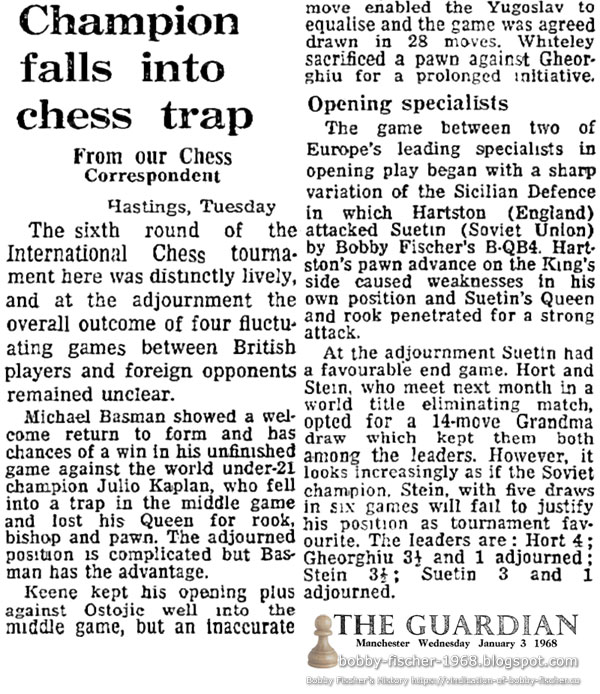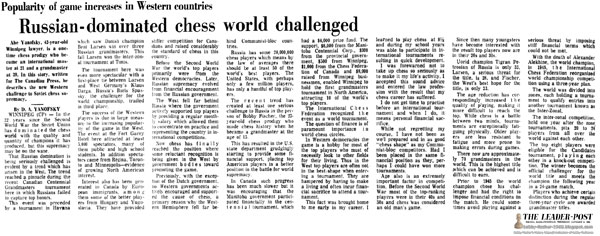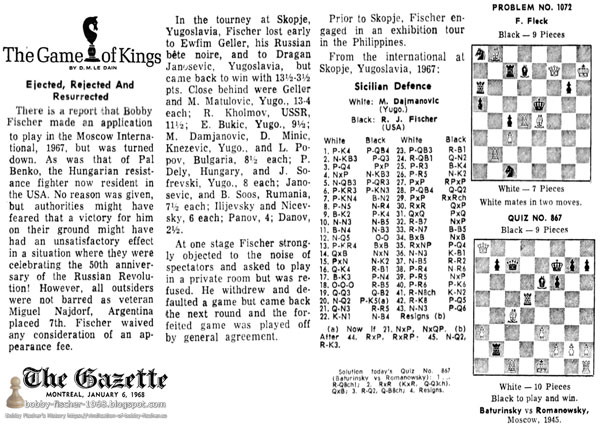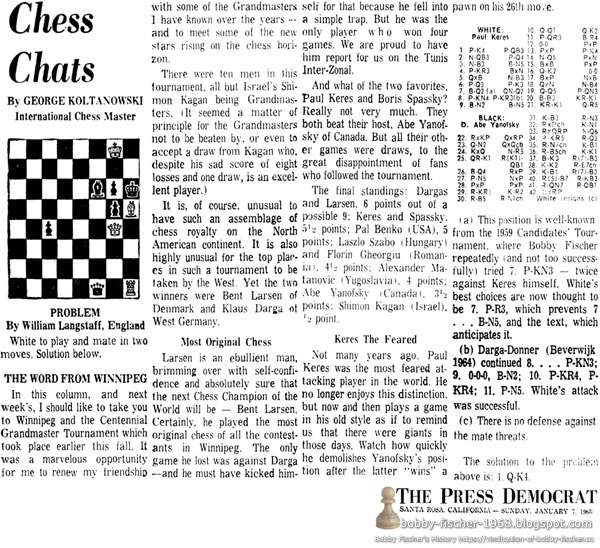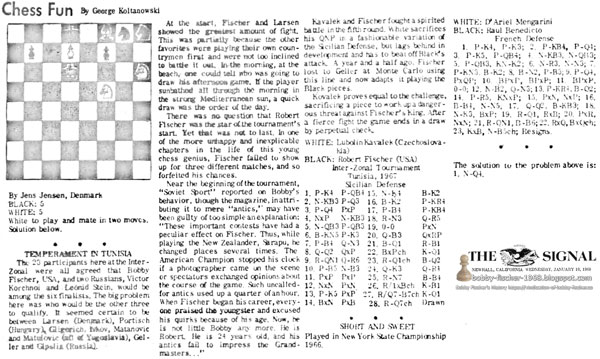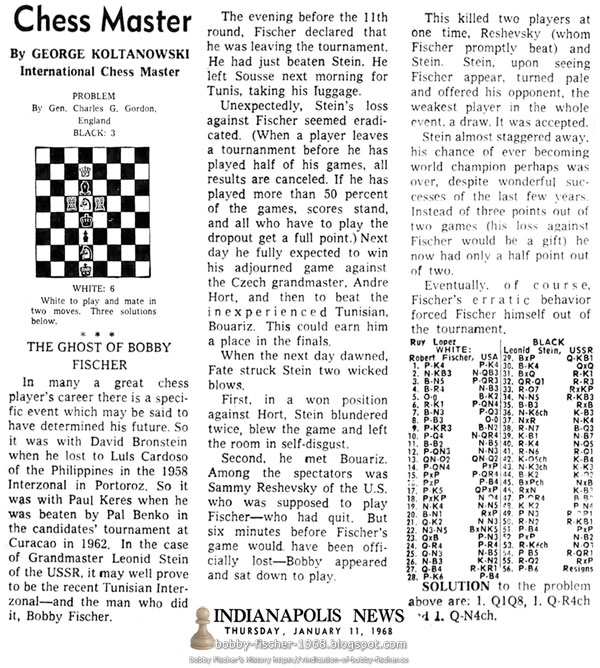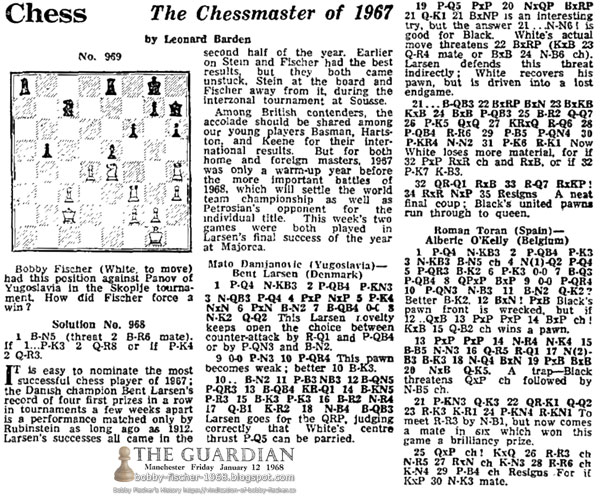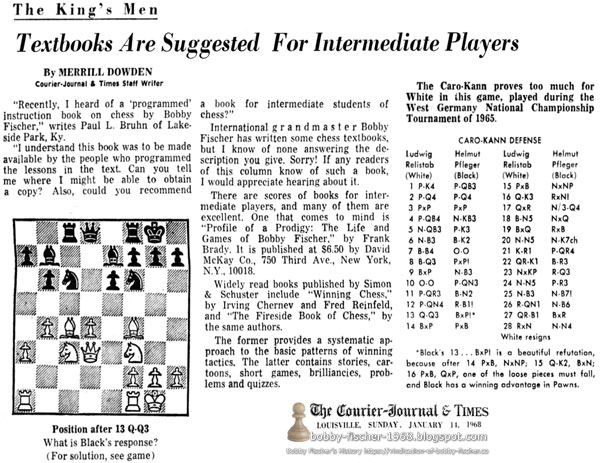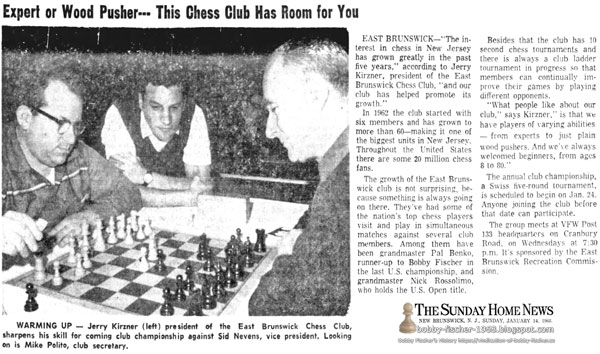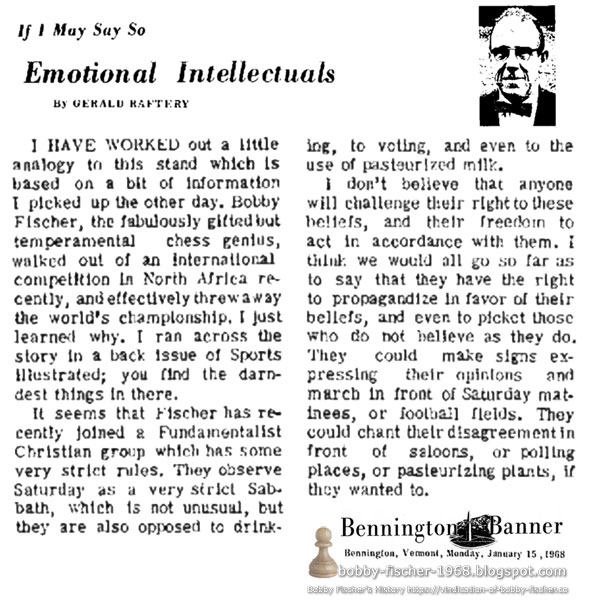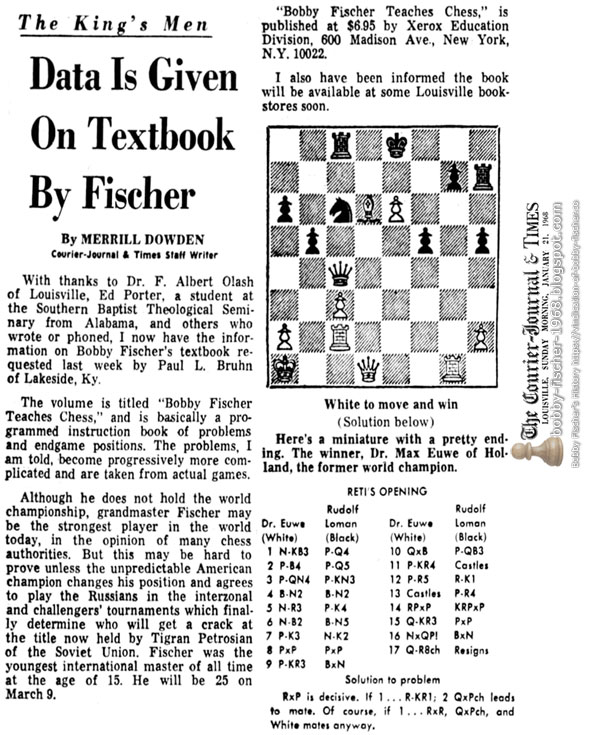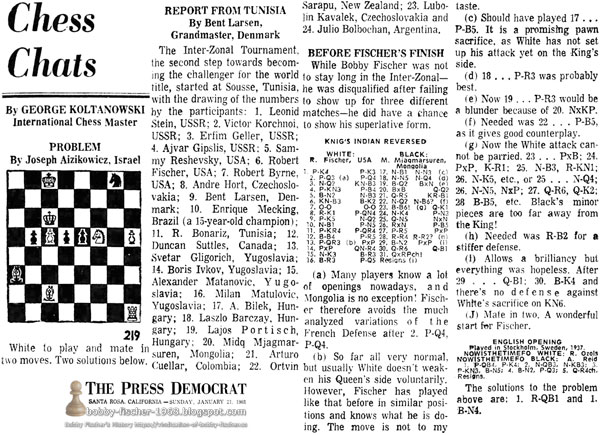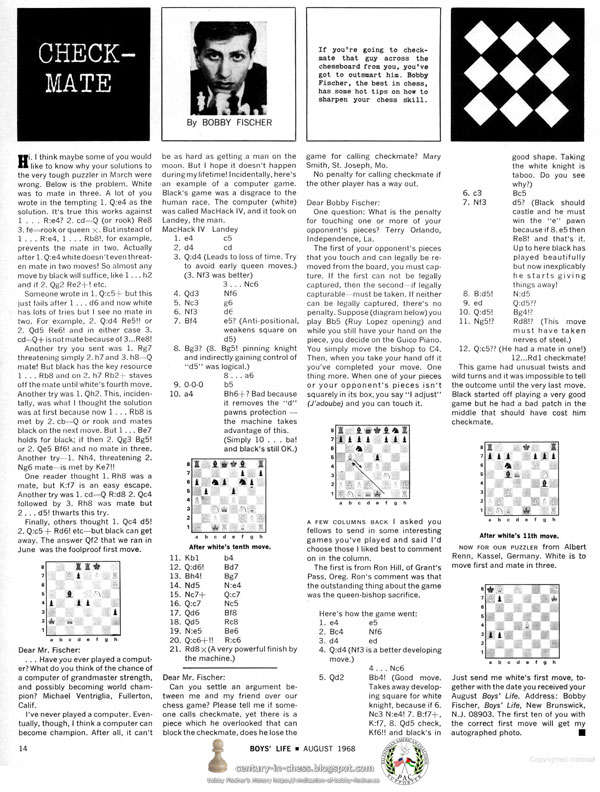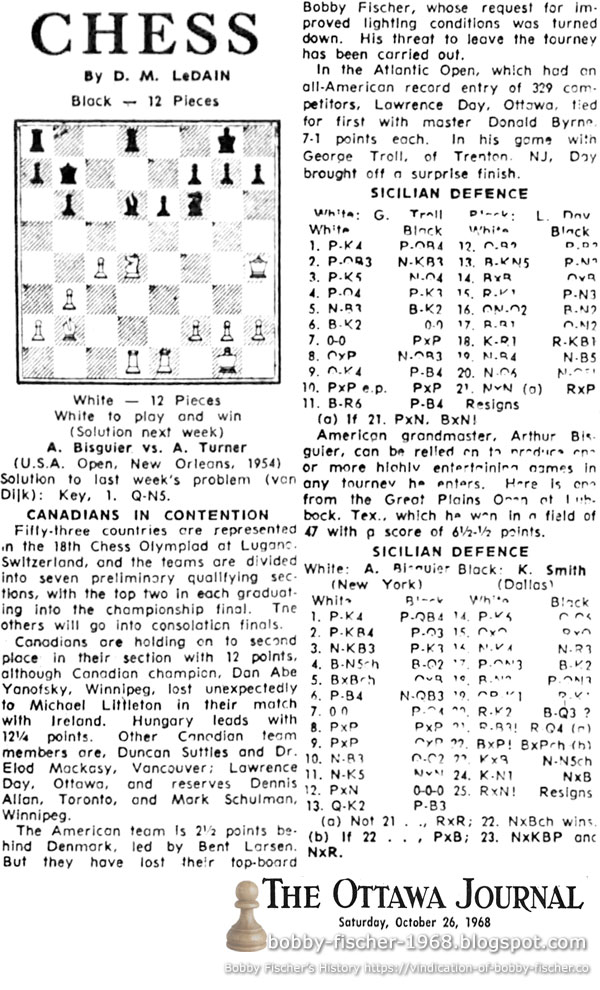The Guardian London, Greater London, England Wednesday, January 03, 1968 - Page 12
Champion Falls Into Chess Trap
Hastings, Tuesday
The sixth round of the International Chess tournament here was distinctly lively, and at the adjournment the overall outcome of four fluctuating games between British players and foreign opponents remained unclear.
Michael Basman showed a welcome return to form and has chances of a win in his unfinished game against the world under-21 champion Julio Kaplan, who fell into a trap in the middle game and lost his Queen for rook, bishop and pawn. The adjourned position is complicated but Basman has the advantage.
Keene kept his opening plus against Ostojic well into the middle game, but an inaccurate move enabled the Yugoslav to equalise and the game was agreed drawn in 28 moves. Whiteley sacrificed a pawn against Gheorghiu for a prolonged initiative.
Opening specialists
The game between two of Europe's leading specialists in opening play began with a sharp variation of the Sicilian Defense in which Hartston (England) attacked Suetin (Soviet Union) by Bobby Fischer's B-QB4. Hartsten's pawn advance on the King's side caused weaknesses in his own position and Suetin's Queen and rook penetrated for a strong attack.
At the adjournment Suetin had a favorable end game. Hort and Stein, who meet next month in a world title eliminating match, opted for a 14-move Grandma draw which kept them both among the leaders. However, it looks increasingly as if the Soviet champion, Stein, with five draws in six games will fail to justify his position as tournament favorite. The leaders are: Hort 4; Gheorghiu 3½ and 1 adjourned; Stein 3½; Suetin 3 and 1 adjourned.
This article also appears in,
- Times Colonist Victoria, British Columbia, Canada Thursday, January 04, 1968 - Page 25 “Soviet Experts Challenged: Grants Key to Growth Of West Chess Hopes”
- The Brandon Sun Brandon, Manitoba, Canada Thursday, January 04, 1968 - Page 12 “Soviet Supremacy In Chess Declines”
- The Province Vancouver, British Columbia, Canada Wednesday, January 10, 1968 - Page 25 “Chess: West Challenges Soviet Supremacy”
- The Ottawa Journal Ottawa, Ontario, Canada Saturday, January 27, 1968 - Page 44 “Soviet Chess Supremacy May Be on the Wane”
The Leader-Post Regina, Saskatchewan, Canada Thursday, January 04, 1968 - Page 10
Popularity of game increases in Western countries
Russian-dominated chess world challenged
Abe Yanofsky, 42-year-old Winnipeg lawyer, is a one-time chess prodigy who became an international master at 21 and a grandmaster at 39. In this story, written for The Canadian Press, he describes the new Western challenge to Soviet chess supremacy.
—
By D.A. YANOFSKY
WINNIPEG (CP) — In the 22 years since the Second World War the Soviet Union has dominated the chess world with the quality and quantity of champions it has produced, but this supremacy may be on the wane.
That Russian domination is being seriously challenged is evident by a trend which has arisen in the West. The trend reached a pinnacle during the recent Canadian Centennial Grandmasters tournament here in which Russians failed to capture top honors.
This event was preceded by a tournament in Havana which saw Danish champion Bent Larsen win over three Russian grandmasters. This fall Larsen won the interzonal tournament at Tunis.
The tournament here was even more spectacular with a first-place tie between Larsen and West Germany's Klaus Darga. Russia's Boris Spassky, the challenger for the world championship, trailed in third place.
The success of the Western players is due in large measure to the increasing popularity of the game in the West. The event at the Fort Garry Hotel here attracted at least 5,000 spectators, many of them public and high school students. In addition spectators came from Regina, Toronto and Minneapolis—evidence of growing North American interest.
Interest also has been generated in Canada by European immigrants, among them some of the better players from Hungary and Yugoslavia. They have provided
stiffer competition for Canadians and raised considerably the standard of chess in this country.
Before the Second World War the world's top players primarily were from the Western democracies. Later, Russian supremacy evolved from financial encouragement front the Russian government.
The West fell far behind Russia where the government active!y supported top players by providing a regular monthly salary which allowed them to concentrate on practice and representing the country in international competitions.
Now chess has finally reached the position where some reluctant recognition is being given in the West by government bodies toward promoting the game.
Previously, with the exception of the Dutch government, no Western governments actively encouraged and supported the cause of chess, a primary reason why the Western Hemisphere fell far behind Communist-bloc countries.
Russia has some 20,000,000 chess players which means by the law of averages there should be at least 50 of the world's best players. The United States, with perhaps only a few million players, has only a handful of top players.
The recent trend has created at least one serious challenge to Russia in the person of Bobby Fischer, the 23-year-old chess prodigy who made chess history when he became a grandmaster at the age of 15.
This has resulted in the U.S. state department grudgingly starting to provide some financial support, placing top American players in a better position in the battle for world supremacy.
In Canada such progress has been much slower but it was encouraging that the Manitoba government participated financially in the centennial tournament, which had a $4,000 prize fund. The support, $6,000 from the Manitoba Centennial Corp., $300 from the provincial government, $500 from Winnipeg, $1,000 from the Chess Federation of Canada and $8,000 raised from Winnipeg businessmen, enabled Winnipeg to hold the first grandmasters tournament in North America, attracting 10 of the world's top players.
The International Chess Federation recognized the event as a world tournament.
The question of finance is of paramount importance in world chess circles.
In Western democracies the game is a hobby for most of the top players who must of necessity look to other fields for their living. Thus in the West top players are often not in the best shape when entering a tournament. They are hampered by having to make a living and often incur financial sacrifice to attend a tournament.
This fact was brought home to me early in my career. I learned to play chess at and during my school years was able to participate in international tournaments resulting in quick development.
I was forewarned not to take up chess so seriously as to make it my life's activity. I accepted this sound advice and entered the law profession with the result that my chess career has suffered. I do not get time to practice before an international tournament and when I do, it means personal financial sacrifice.
While not regretting my course, I have not been as well prepared and in as good “chess shape” as my Communist-bloc competitors. Had I been placed in the same financial position as they, perhaps I could have won more tournaments.
Age also is an extremely important factor in competition. Before the Second World War most of the top-ranking players were in their 40s and 50s and chess was considered an old man's game.
Since then many youngsters have become interested with the result top players now are in their 20s and 30s.
World champion Tigran Petrosian of Russia is only 33, Larsen, a serious threat for the title, is 28, and Fischer, the West's best hope for the title, is only 23.
The age reduction has correspondingly increased the quality of playing, making it more difficult to reach the top. While chess is a battle between two minds, tournaments are exceptionally fatiguing physically. Older players are less resistant to fatigue and more prone to making errors during games.
There now are approximately 70 grandmasters in the world. This is the highest title which can be achieved and is difficult to earn. Prior to 1945 the world champion chose his challenger and had the right to impose financial conditions on the match. He could sometimes avoid playing against a serious threat by imposing stiff financial terms which could not be met.
With the death of Alexander Alekhine, the world champion, in 1945, the International Chess Federation reorganized world championship competition using a three-year plan.
The world was divided into zones, each holding a tournament to qualify entries into another tournament known as the Inter-Zonal. The inter-zonal competition, held one year after the zone, tournaments, pits 20 to 24 players from all over the world against each other.
The top eight players were eligible for the Candidates tournament, playing each other in a knock-out competition. The winner becomes the official challenger for the world title and meets the champion the following year in a 24-game match.
Players who achieve certain distinction during the regular three-year cycle are awarded grandmaster titles.
The Gazette Montreal, Quebec, Canada Saturday, January 06, 1968 - Page 11
Ejected, Rejected And Resurrected
There is a report that Bobby Fischer made an application to play in the Moscow International, 1967, but was turned down. As was that of Pal Benko, the Hungarian resistance fighter now resident in the USA. No reason was given, but authorities might have feared that a victory for him on their ground might have had an unsatisfactory effect in a situation where they were celebrating the 50th anniversary of the Russian Revolution! However, all outsiders were not barred as veteran Miguel Najdorf, Argentina placed 7th. Fischer waived any consideration of an appearance fee.
In the tourney at Skopje, Yugoslavia, Fischer lost early to Ewfim Geller, his Russian bête noire, and to Dragan Janosevic, Yugoslavia, but came back to win with 13½-3½ pts. Close behind were Geller and M. Matulovic, Yugo., 13-4 each; R. Kholmov, USSR, 11½ E. Bukic, Yugo., 9½; M. Damjanovic, D. Minic, Knezevic, Yugo., and L. Popov, Bulgaria, 8½ each; P. Dely, Hungary, and J. Sofrevski, Yugo., 8 each; Janosevic, and B. Soos, Rumania, 7½ each; Ilijevsky and Nicevsky, 6 each; Panov, 4; Danov, 2½.
At one stage Fischer strongly objected to the noise of spectators and asked to play in a private room but was refused. He withdrew and defaulted a game but came back the next round and the forfeited game was played off by general agreement.
Prior to Skopje, Fischer engaged in an exhibition tour in the Philippines.
From the international at Skopje, Yugoslavia, 1967:
This article also appears in,
- El Paso Times El Paso, Texas Sunday, January 14, 1968 - Page 97 “Chats On Chess”
The Press Democrat Santa Rosa, California Sunday, January 07, 1968 - Page 29
Keres The Feared
“(a)This position is well-known from the 1959 Candidates' Tournament, where Bobby Fischer repeatedly (and not too successfully) tried 7. P-KN3 — twice against Keres himself. White's best choices are now thought to be 7. P-R3, which prevents 7 … B-N5, and the text, which anticipates it.
This article also appears in,
- The Press Democrat Santa Rosa, California Sunday, January 28, 1968 - Page 34 “Temperament In Tunisia”
The Signal Santa Clarita, California Wednesday, January 10, 1968 - Page 14
Temperament In Tunisia
The 23 participants here at the Inter-Zonal were all agreed that Bobby Fischer, USA, and two Russians, Victor Korchnoi and Leonid Stein, would be among the six finalists. The big problem here was who would be the other three to qualify. It seemed certain to be between Larsen (Denmark), Portisch (Hungary), Gligoric, Ivkov, Matanovic and Matulovic (all of Yugoslavia), Geller and Gipslis (Russia).
At the start, Fischer and Larsen showed the amount of fight. This was partially because the other favorites were playing their own countrymen first and were not toi inclined to battle it out. In the morning, at the beach, one could tell who was going to draw his afternoon game. If the player sunbathed all through the morning in the strong Mediterranean sun, a quick draw was the order of the day.
There was no question that Robert Fischer was the star of the tournament's start. Yet that was not to last. In one of the more unhappy and inexplicable chapters in the life of this young chess genius, Fischer failed to show up for three different matches, and so forfeited his chances.
Near the beginning of the tournament, “Soviet Sport” reported on Bobby's behavior, though the magazine, in attributing it to mere “antics,” may have been guilty of too simple an explanation: “These important contests have had a peculiar effect on Fischer. Thus, while playing the New Zealander, Sarapu, he changed places several times. The American Champion stopped his clock if a photographer came on the scene or spectators exchanged opinions about the coursed the game. Such uncalled-for antics used up a quarter of an hour. When Fischer began his career, every-one praised the youngster and excused his quirks because of his age. Now, he is not little Bobby more. He Robert. He is 24 years old, and his antics fail to impress the Grand-masters…”
Kavalek and Fischer fought a spirited battle in the fifth round. White sacrifices his QNP in a fashionable variation of the Sicilian Defense, but lags behind in development and has to beat off Black's attack. A year and a half ago. Fischer lost to Geller at Monte Carlo using this line and now adapts it playing the Black pieces.
Kavalek proves equal to the challenge, sacrificing a piece to work up a dangerous threat against Fischer's King. After a fierce fight the game ends in a draw by perpetual check.
The Indianapolis News Indianapolis, Indiana Thursday, January 11, 1968 - Page 44
Chess Master: The Ghost of Bobby Fischer
In many a great chess player's career there is a specific event which may be said to have determined his future. So it was with David Bronstein when he lost to Luis Cardoso of the Philippines in the 1958 Interzonal in Portoroz. So it was with Paul Keres when he was beaten by Pal Benko in the candidates' tournament at Curacao in 1962. In the case of Grandmaster Leonid Stein of the USSR, it may well prove to be the recent Tunisian Inter-zonal-and the man who did it, Bobby Fischer.
The evening before the 11th round, Fischer declared that he was leaving the tournament. He had just beaten Stein. He left Sousse next morning for Tunis, taking his luggage.
Unexpectedly, Stein's loss against Fischer seemed eradicated. (When a player leaves a tournament before he has played half of his games, all results are canceled. If he has played more than 50 percent of the games, scores stand, and all who have to play the dropout get a full point.) Next day he fully expected to win his adjourned game against the Czech grandmaster, Andre Hort, and then to beat the inexperienced Tunisian, Bouariz. This could earn him a place in the finals.
When the next day dawned, Fate struck Stein two wicked blows.
First, in a won position against Hort, Stein blundered twice, blew the game and left the room in self-disgust.
Second, he met Bouariz. Among the spectators was Sammy Reshevsky of the U.S. who was supposed to play Fischer-who had quit. But six minutes before Fischer's game would have been officially lost-Bobby appeared and sat down to play.
This killed two players at one time, Reshevsky (whom Fischer promptly beat) and Stein. Stein, upon seeing Fischer appear, turned pale and offered his opponent, the weakest player in the whole event, a draw. It was accepted.
Stein almost staggered away, his chance of ever becoming world champion perhaps was over, despite wonderful successes of the last few years. Instead of three points out of two games (his loss against Fischer would be a gift) he now had only a half point out of two.
Eventually, of course, Fischer's erratic behavior forced Fischer himself out of the tournament.
The Guardian, London, Greater London, England, Friday, January 12, 1968 - Page 2
The Chessmaster of 1967
Bobby Fischer (White to move) had this position against Panov of Yugoslavia in the Skoplje tournament. How did Fischer force a win?
Solution No. 968
It is easy to nominate the most successful chess player of 1967; the Danish champion Bent Larsen's record of four first prizes in a row in tournaments a few weeks apart is a performance matched only by Rubinstein as long ago as 1912. Larsen's successes all came in the second half of the year. Earlier on Stein and Fischer had the best results, but they both came unstuck, Stein at the board and Fischer away from it, during the interzonal tournament at Sousse.
Among British contenders, the accolade should be shared among our young players Basman, Hartston, and Keene for their international results. But for both home and foreign masters, 1967 was only a warm-up year before the more important battles of 1968, which will settle the world team championship as well as Petrosian's opponent for the individual title. This week's two games were both played in Larsen's final success of the year at Majorca.
The Courier-Journal Louisville, Kentucky Sunday, January 14, 1968 - Page 42
Textbooks Are Suggested For Intermediate Players
“Recently, I heard of a ‘programmed’ instruction book on chess by Bobby Fischer,” writes Paul L. Bruhn of Lakeside Park, Ky.
“I understand this book was to be made available by the people who programmed the lessons in the text. Can you tell me where I might be able to obtain a copy? Also, could you recommend
a book for intermediate students of chess?”
International grandmaster Bobby Fischer has written some chess textbooks, but I know of none answering the description you give. Sorry! If any readers of this column know of such a hook, I would appreciate hearing about it.
There are scores of books for intermediate players, and many of them are excellent. One that comes to mind is “Profile of a Prodigy: The Life and Games of Bobby Fischer,” by Frank Brady. It is published at $6.50 by David McKay Co., 750 Third Ave., New York, N.Y., 10018. Widely read books published by Simon & Schuster include “Winning Chess,” by Irving Chernev and Fred Reinfeld, and “The Fireside Book of Chess,” by the same authors.
The former provides a systematic approach to the basic patterns of winning tactics. The latter contains stories, cartoons, short games, brilliancies, problems and quizzes.
The Central New Jersey Home News New Brunswick, New Jersey Sunday, January 14, 1968 - Page 9
Expert or Wood Pusher--This Chess Club Has Room for You
(Caption: Warming Up—Jerry Kirzner (left) president of the East Brunswick Chess Club, sharpens his skill for coming club championship against Sid Nevens, vice president. Looking on is Mike Polito, club secretary.)
EAST BRUNSWICK—“The interest in chess in New Jersey has grown greatly in the past five years,” according to Jerry Kirzner, president of the East Brunswick Chess Club, “and our club has helped promote its growth.”
In 1962 the club started with six members and has grown to more than 60—making it one of the biggest units in New Jersey. Throughout the United States there are some 20 million chess fans.
The growth of the East Brunswick club is not surprising, because something is always going on there. They've had some of the nation's top chess players visit and play in simultaneous matches against several club members. Among them have been grandmaster Pal Benko, runner-up to Bobby Fischer in the last U.S. championship, and grandmaster Nick Rossolimo, who holds the U.S. Open title.
Besides that the club has 10 second chess tournaments and there is always a club ladder tournament in progress so that members can continually improve their games by playing different opponents.
“What people like about our club,” says Kirzner, “is that we have players of varying abilities — from experts to just plain wood pushers. And we've always welcomed beginners, from ages 8 to 80.”
The annual club championship, a Swiss five-round tournament, is scheduled to begin on Jan. 24. Anyone joining the club before that date can participate.
The group meets at VFW Post 133 headquarters on Cranbury Road, on Wednesdays at 7:30 p.m. Its sponsored by the East Brunswick Recreation Commission.
Emotional Intellectuals
I HAVE WORKED out a little analogy to this stand which is based on a bit of information I picked up the other day. Bobby Fischer, the fabulously gifted but temperamental chess genius, walked out of an international competition in North Africa recently, and effectively threw away the world's championship. I just learned why. I ran across the story in a back issue of Sports illustrated; you find the darndest things in there.
It seems that Fischer has recently joined a Fundamentalist Christian group, which has some very strict rules. They observe Saturday as a very strict Sabbath, which is not unusual, but they are also opposed to drinking, to voting, and even to the use of pasteurized milk.
I don't believe that anyone will challenge their right to these beliefs, and their freedom to act in accordance with them. I think we would all go so far as to say that they have the right to propagandize in favor of their beliefs, and even to picket those who do not believe as they do. They could make signs expressing their opinions and march in front of Saturday matinees, or football fields. They could chant their disagreement in front of saloons, or polling places, or pasteurizing plants, if they wanted to.
The Courier-Journal Louisville, Kentucky Sunday, January 21, 1968 - Page 42
Data Is Given On Textbook By Fischer
With thanks to Dr. F. Albert Olash of Louisville, Ed Porter, a student at the Southern Baptist Theological Seminary from Alabama, and others who wrote or phoned, I now have the information on Bobby Fischer's textbook requested last week by Paul L. Bruhn of Lakeside, Ky.
The volume is titled “Bobby Fischer Teaches Chess,” and is basically a programmed instruction book of problems and endgame positions. The problems, I am told, become progressively more complicated and are taken from actual games.
Although he does not hold the world championship, grandmaster Fischer may be the strongest player in the world today, in the opinion of many chess authorities. But this may be hard to prove unless the unpredictable American champion changes his position and agrees to play the Russians in the interzonal and challengers' tournaments which finally determine who will get a crack at the title now held by Tigran Petrosian of the Soviet Union. Fischer was the youngest international master of all time at the age of 15. He will be 25 on March 9.
“Bobby Fischer Teaches Chess,” is published at $6.95 by Xerox Education Division, 600 Madison Ave., New York, N.Y. 10022.
I also have been informed the book will be available at some Louisville book-stores soon.
White to move and win
Here's a miniature with a pretty ending. The winner, Dr. Max Euwe of Holland, the former world champion.
This article also appears in,
- El Paso Times El Paso, Texas Sunday, January 28, 1968 - Page 87 “Report from Tunisia”
The Press Democrat Santa Rosa, California Sunday, January 21, 1968 - Page 13
Report From Tunisia
By Bent Larsen, Grandmaster, Denmark
The Inter-Zonal Tournament, the second step towards becoming the challenger for the world title, started at Sousse, Tunisia, with the drawing of the numbers by the participants: 1. Leonid Stein, USSR; 2. Victor Korchnoi, USSR; 3. Erfim Geller, USSR; 4. Ajvar Gipslis, USSR; 5. Sammy Reshevsky, USA; 6. Robert Fischer, USA; 7. Robert Byrne, USA; 8. Andre Hort, Czechoslovakia; 9. Bent Larsen, Denmark; 10. Enrique Mecking, Brazil (a 15-year-old champion); 11. R. Bonariz, Tunisia; 12. Duncan Suttles, Canada; 13. Svetar Gligorich, Yugoslavia; 14. Boris Ivkov, Yugoslavia; 15. Alexander Matanovic, Yugoslavia; 16. Milan Matulovic, Yugoslavia; 17. A. Bilek, Hungary; 18. Laszlo Barczay, Hungary; 19. Lajos Portisch, Hungary; 20. Midq Mjagmarsuren, Mongolia; 21. Arturo Cuellar, Colombia; 22. Ortvin Sarapu, New Zealand; 23. Lubalin Kavalek, Czechoslovakia and 24. Julio Bolbochan, Argentina.
Before Fischer's Finish
While Bobby Fischer was not to stay long in the Inter-Zonal-he was disqualified after failing to show up for three different matches-he did have a chance to show his superlative form.
(a) Many players know a lot of openings nowadays, and Mongolia is no exception! Fischer therefore avoids the much analyzed variations of the French Defense after 2. P-Q4, P-Q4.
(b) So far all very normal, but usually White doesn't weaken his Queen's side voluntarily. However, Fischer has played like that before in similar positions and knows what he is doing. The move is not to my taste.
(c) Should have played 17 … P-B5. It is a promising pawn sacrifice, as White has not set up his attack yet on the King's side.
(d) 18 … P-R3 was probably best.
(e) Now 19 … P-R3 would be a blunder because of 20. NxKP.
(f) Needed was 22 … P-B5, as it gives good counterplay.
(g) Now the White attack cannot be parried, 23 … PxB; 24. PxP, K-R1; 25. N-B3, R-KN1; 26. N-K5, etc., or 25 … N-Q4; 26. N-N5, NxP; 27. Q-R6, Q-K2; 28 B-B5, etc. Black's minor pieces are too far away from the King!
(h) Needed was R-B2 for a stiffer defense.
(i) Allows a brilliancy but everything was hopeless. After 29… Q-B 1; 30. B-K4 and there's no defense against White's sacrifice on KN6.
(j) Mate in two. A wonderful start for Fischer.
Check-Mate by Bobby Fischer
If you're going to check-mate that guy across the chessboard from you, you've got to outsmart him. Bobby Fischer, the best in chess, has some hot tips on how to sharpen your chess skill.
Hi. I think maybe some of you would like to know why your solutions to the very tough puzzler in March were wrong. Below is the problem. White was to mate in three. A lot of you wrote in the tempting 1. Q:e4 as the solution. It's true this works against 1 . . . R:e4? 2.cd=Q (or rook) Re8 3. fe=rook or queen ☓. But instead of 1 . . . R:e4, 1 . . . Rb8#!, for example, prevents the mate in two. Actually after 1. Q:e4 white doesn't even threaten mate in two moves! So almost any move by black will suffice, like 1 . . . h2 and if 2. Qg2 Re2+! etc.
Someone wrote in 1. Q:c5+ but this just fails after 1 . . . d6 and now white has lots of tries but I see no mate in two. For example, 2 Q:d4 Re5!! or 2. Qd5 Re6! and in either case 3. cd=Q+ is not mate because of 3…Re8!
Another try you sent was 1. Rg7 threatening simply 2. h7 and 3. h8&9868;Q mate! But black has the key resource 1 . . . Rb8 and on 2. h7 Rb2+ staves off the mate until white's fourth move. Another try was 1. Qh2. This, incidentally, was what I thought the solution was at first because now 1 . . . Rb8 is met by 2. cb⚌Q or rook and mates black on the next move. But 1 . . . Be7 holds for black; if then 2. Qg3 Bg5! or 2. Qe5 Bf6! and no mate in three. Another try—1. Nh4, threatening 2. Ng6 mate—is met by Ke7!!
One reader thought 1. Rh8 was a mate, but K:f7 is an easy escape. Another try was 1. cd⚌Q R:d8 2. Qc4 followed by 3. Rh8 was mate but 2 . . . d5! thwarts this try.
Finally, others thought 1. Qc4 d5! 2. Q:c5 + Rd6! etc—but black can get away. The answer Qf2 that we ran in June was the foolproof first move.
Dear Mr. Fischer:
…Have you ever played a computer? What do you think of the chance of a computer of grandmaster strength, and possibly becoming world champion? Michael Ventriglia, Fullerton, Calif.
I've never played a computer. Eventually, though, I think a computer can become champion. After all, it can't be as hard as getting a man on the moon. But I hope it doesn't happen during my lifetime! Incidentally, here's an example of a computer game. Black's game was a disgrace to the human race. The computer (white) was called MacHack IV, and it took on Landey, the man.
Dear Mr. Fischer:
Can you settle an argument between me and my friend over our chess game? Please tell me if someone calls checkmate, yet there is a piece which he overlooked that can block the checkmate, does he lose the game for calling checkmate? Mary Smith, St. Joseph, Mo.
No penalty for calling checkmate if the other player has a way out.
Dear Bobby Fischer:
One question: What is the penalty for touching one or more of your opponent's pieces? Terry Orlando, Independence, La.
The first of your opponent's pieces that you touch and can legally be removed from the board, you must capture. If the first can not be legally captured, then the second—if legally capturable—must be taken. If neither can be legally captured, there's no penalty. Suppose (diagram below) you play Bb5 (Ruy Lopez opening) and while you still have your hand on the piece, you decide on the Guico Piano. You simply move the bishop to C4. Then, when you take your hand off it you've completed your move. One thing more. When one of your pieces or your opponent's pieces isn't squarely in its box, you say “I adjust” (J'adoube) and you can touch it.
A few columns back I asked you fellows to send in some interesting games you've played and said I'd choose those I liked best to comment on in the column.
The first is from Ron Hill, of Grant's Pass, Oregon. Ron's comment was that the outstanding thing about the game was the queen-bishop sacrifice. Here's how the game went.
1. e4 e5 2. Bc4 Nf6 3. d4 ed 4. Q:d4 (Nf3 is a better developing move.) 4 . . . Nc6 5. Qd2 Bb4! (Good move. Takes away developing square for white knight, because if 6. Nc3 N:e4! 7. B:f7+, K:f7, 8. Qd5 check, Kf6!! and black's in good shape. Taking the white knight is taboo. Do you see why?) 6. c3 Bc5 7. Nf3 d5? (Black should castle and he must win the “e” pawn because if 8. e5 then Re8! and that's it. Up to here black has played beautifully but now inexplicably he starts giving things away! 8. B:d5! N:d5 9. ed Q:d5?? 10. Q:d5! Bg4!? 11. Ng5!? Rd8!? (This move must have taken nerves of steel.) 12. Q:c5?? (He had a mate in one!) 12…Rd1 checkmate!
This game had unusual twists and wild turns and it was impossible to tell the outcome until the very last move. Black started off playing a very good game but he had a bad patch in the middle that should have cost him checkmate.
Now for our puzzler from Albert Renn, Kassel, Germany. White is to move first and mate in three.
Just send me white's first move, together with the date you received your August Boys' Life Address: Bobby Fischer, Boys' Life, New Brunswick, N.J. O8903. The first ten of you with correct first move will get my autographed photo.
The Ottawa Journal, Ottawa, Ontario, Canada, Saturday, October 26, 1968 - Page 49
Refusal of Organizers to Provide Improved Lighting
“The American team is 2½ points behind Denmark, led by Bent Larsen. But they have lost their top-board Bobby Fischer, whose request for improved lighting conditions was turned down. His threat to leave the tourney has been carried out.”











